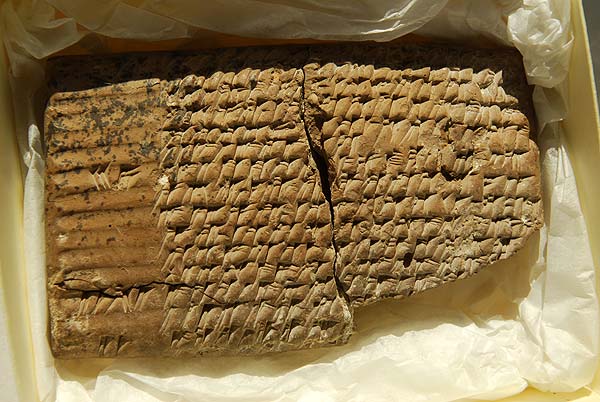U.S. returns hundreds of Achaemenid tablets to Iran

By Sara Rajabova
The United States has returned 350 of Achaemenid tablets, which provide details of the daily workings of Achaemenid Persia around 500 B.C., to Iran.
Head of Iran's Cultural Heritage, Handicrafts and Tourism Masood Soltanifar said Iran is trying to return more of the tablets.
The tablets were discovered by the researchers from University of Chicago archaeologists in 1933 while they were excavating in Persepolis, the site of a major Oriental Institute excavation.
Over 30,000 pieces of Achaemenid tablets were given to the Oriental Institute of the University of Chicago for academic studies in 1935 during the rule of the former monarchical regime, but were not returned to Iran.
The artifacts bear cuneiform script explaining administrative details of the Achaemenid Empire from about 500 B.C. They are among a group of tens of thousands of tablets and tablet fragments that were loaned to the university's Oriental Institute in 1937 for study. A group of 179 complete tablets was returned in 1948, and another group of more than 37,000 tablet fragments was returned in 1951.
Soltanifar further said 200 pieces of tablets were returned in 2001.
Soltanifar hoped that with the legal efforts underway, all Iranian historical relics be returned to Iran.
A U.S. court has issued a verdict to keep the relics on hold in the United States.
In spring 2006, U.S. District Court Judge Blanche Manning ruled that a group of people injured by a 1997 bombing in Israel could seize the 300 clay tablets given to the University of Chicago's Oriental Institute and the university cannot protect Iran's ownership rights to the artifacts.
Following Iranian officials' protests against the ruling, the court was supposed to reexamine the case on December 2006, but the court session was postponed to January 19, 2007, due to the fact that Iran had not provided all the documents required by the court. The court session was held on the above-mentioned date, but no verdict was issued.
Museum of London has voiced support for the return of the collection of clay tablets to Iran as the owner of the artifacts.
Chicago's Oriental Institute holds 8000 to 10,000 intact and about 11,000 fragmented tablets, as estimated by Gil Stein, the director of the university's Oriental Institute.
Information from the tablets provided one of the first opportunities to gather data on the empire from Persian sources.
Stein earlier called on Abdolmajid Arfayee a researcher and translator of ancient languages to translate the Achaemenid tablets.
Arfayee said in May 2013 the Persian and English translations of 647 Achaemenid clay tablets will be published in a book by the end of the current Iranian year (started March 21).
The tablets have been difficult to read because information about the Persian Empire had been largely limited to non-Persian sources. That non-Persian information came from Greek writers such as Herodotus and Latin authors, and mostly concerns encounters between the Persian Empire and Greek states, encounters of warfare, and diplomacy.
In addition to administrative information on the empire and its governance, the texts also contain seal impressions that indicate the existence of some otherwise-unknown administrative offices. The texts identify for the first time leaders of various portions of the empire and expand on material in other non-Persian texts.
